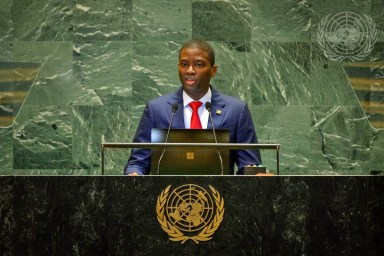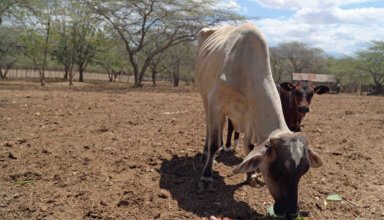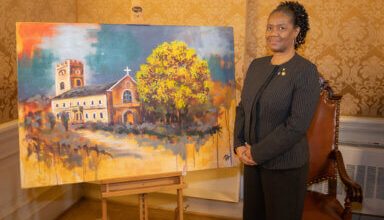Grenada PM tells impassioned, personal story on resilience as core of UN address

Grenada Prime Minister Dickon Mitchell on Saturday made resilience the core of his contribution to the United Nations General Assembly Debate, saying that he wanted to speak about the topic in the face of climate change, paths to economic resilience, and the role of education in ensuring both.
In his address to the 79th Session of the General Assembly Debate, Mitchell, who is also the current chair of the Caribbean Community (CARICOM), said this notion of resilience is not just a policy goal for him but is “deeply personal,” telling an impassioned story that, he said, “at its heart, is an experience that has been shared among so many of us in Grenada and the Caribbean.”
The Grenada prime minister said he was born in 1977 in a small hillside village in the parish of St. David in Grenada, where most households, including his own, did not have running water or electricity.
“We would walk to the public standpipe to fetch water in buckets,” he said. “In my small agricultural community, the people I lived with worked the land or took up domestic work in town. At the time, that was common in Grenada; we were an agricultural island and lived modest lives built on hard work, community, and a sense of determination.”
But Mitchell said that, when he was quite young, that began to change, noting that, in 1979, Grenada experienced a political revolution that brought many changes.
He said education, as well as tourism, “became a focus.”
Then, in 1983, when he was only six years old, Mitchell said the revolution came to a “violent end, and we were thrust into the spotlight of global politics because of American intervention. It was a dividing line in our shared history and in mine.”
By 1989, the prime minister said both of his parents had left the island to pursue work opportunities overseas and that his aunt helped to raise him and his siblings.
In the years that followed, he said he continued his education.
However, at that time in Grenada, he said education was not state-funded after age 16. So, to continue his studies, Mitchell said he had to “hustle and develop entrepreneurial skills.” He disclosed that he “collected spice in the hills and sold it” and that many of the kids from his village did the same.
He said those years were “frugal” and that he had to be disciplined.
Once he finished his A-level subjects, Mitchell said he returned to teach at his high school, “much to the amusement of my friends — many of whom were still attending there.
“This role helped me save for the next step in my educational journey, law school in Barbados and Trinidad and Tobago,” he said.
Within a few years, Mitchell said he became a lawyer in Grenada with his practice, serving clients locally and internationally.
“My personal resilience, in the face of the many difficulties that crossed my path over the years, allowed me to achieve the dream I sought,” the prime minister said. “Finally, I was in a position to give back to my community.”
In 2020, as the COVID-19 pandemic began to take root in Grenada, he said he could “see the strain on many of our people.
“We could see the glaring inadequacies of the systems and policies that were in place to support us,” he said. “I saw the tension between the government’s decisions and the needs of the people, and I could no longer stay on the sidelines.”
For months, Mitchell said he met with people who felt the same way as he did, “hoping to find ways to help our communities adapt to the challenges.
“Eventually, I realized that no matter how much we try to support change from outside the system, real, meaningful transformation had to come from within,” he said. “It was at this moment that I decided to run for office.
“It was not an easy decision, but I was driven by the belief that leadership means listening, adapting, and being willing to step up when your people need you,” he added. “And now, as prime minister, I am determined to ensure that the resilience I learned becomes a cornerstone of Grenada’s future — and the future of the wider Caribbean.”
Mitchell said a significant priority for him is ensuring that children in Grenada have the opportunity to learn, study, and realize their full potential.
“After all, it was education that took me from a small village to where I stand today — addressing you at the United Nations General Assembly,” he said. “And it is education that will empower the next generation of leaders, thinkers, and dreamers who, I am sure, will go on to achieve even more.”
The Grenadian leader said his government is working to ensure that every child has access to free education until age 18.
“This is because we understand that our greatest asset is our people,” he said. “For small nations like ours, the path to resilience lies in unlocking the potential of our young people. But it is not just about traditional education but about preparing them for a digital and technological future.
“We need to ensure that they have access to digital education, skills training, and the tools they need to compete in the global economy,” he added, stating that digital education — and digitization more broadly — is a priority for his government “because we know that if we want to build future resilience in the next generation of young people, we need to prepare them with the relevant training now.”
At a time where it is possible to work in any market in the world from anywhere in the world, Mitchell said digitization means that “young people in the Caribbean have just as much potential access to global opportunities as their peers in Europe or North America — with the added benefit of year-round sunshine.
“Digitization for Grenadians represents the democratization of opportunity – and this is where international cooperation is crucial,” he said. “By bridging the digital divide, we can empower our young people to create solutions that will help not only Grenada but the entire world move forward into a stronger, more sustainable and more resilient future.”
But Mitchell said, in Grenada, “our resilience has been continually tested,” stating that one of the most challenging moments in recent history came in 2004, when Hurricane Ivan devastated the island, “leaving destruction in its wake and forcing us to rebuild from the ground up.”
Less than one year later, he said Hurricane Emily struck the island, forcing the country to borrow heavily.
But, while the country was thankful to be able to do so, he said, “the financial toll was immense,” lamenting that, for many years after, the island “struggled under the weight of that debt.”
Three months ago, Mitchell said resilience was tested again when Hurricane Beryl hit Carriacou and Petite Martinique, Grenada’s sister islands, “causing unimaginable destruction.”
He said this round of rebuilding will take months, if not years.
“The lesson that we – and the wider CARICOM community – continue to take to heart is that we understand that we cannot continue to rebuild after every storm without seeking sustainable solutions,” he said. “So, with international partnership, we developed innovative financial tools, like the Caribbean Catastrophe Risk Insurance Facility, which allows us to receive financial payouts and recover more swiftly from natural disasters.
“We also introduced a hurricane relief clause in our financial agreements, enabling us to suspend debt payments in times of crisis, giving us the resources we need to focus on recovery,” he added, stating that these efforts “reflect more than just economic policy; they show that small nations like Grenada can develop sophisticated solutions to the challenges we face.
“However, we also understand that we cannot do it alone,” he continued. “We need partnerships with the international community — partnerships that help us access both the financial tools and the technology needed to adapt to this new reality.”
Mitchell noted that Grenada, like many other small island developing states, is “baffled by the continued debate in some spaces about whether climate change exists.
“We do not have the luxury of skepticism,” he said. “Rising sea levels are already affecting lives and livelihoods in our coastal villages, and warming seas continue to spawn stronger and more frequent storms. Hurricane Beryl was the earliest Category 5 hurricane on record in the Atlantic.
“And the message that we in the Caribbean have for those who are looking to adapt to climate change is simple: Learn from us,” he added. “If there is an upside from the many storms that we have endured over the years, it is the lessons that we were able to take away from the various disasters. We have lived through the destructive power of hurricanes, which can erase decades of progress in just a few minutes, but we have also seen that when communities are prepared—we can save lives and livelihoods. There is much more we can— and must— do. We know this.”
Mitchell said the region has a clear vision and plans to harness technology, ranging from drones that assess storm damage to early warning systems that enhance preparedness.
“But we cannot fund these projects alone,” he said. “While nations like Grenada are doing our part, we need the international community to step up and support our efforts. We are asking for more than just financial aid. We are looking for partnerships where we can work together on climate adaptation because we believe the resilience we are building today —through technology, through innovation, through partnerships—can serve as a model for others.
“Friends, we are a living lab on the front lines of a global challenge. Let us help you,” Mitchell added, stating that “the lessons we are learning can help nations facing their climate crises, from wildfires in Canada to flooding in Europe.
“Join us in testing ideas and technologies that can make a difference beyond Grenada,” he urged.
The Grenada prime minister said that resilience cannot be built overnight; “it requires partnerships, innovation, and a shared commitment to a better future.”
He invited the international community to “join us,” asking for the US$100 billion promised to support climate adaptation and mitigation to be met.
“Partnership, in our case, requires concrete financial support to help us rebuild with greater resilience,” Mitchell said. “But beyond that, we are also inviting the international community to partner with us so that we can share our experiences and learn from one another.
“In return, we offer our lessons in resilience,” he added. “We offer the knowledge that comes from living with and dealing with the worst of climate change, from building back after devastation, and from finding innovative policies and programs to secure a digital future.
“Grenada — and CARICOM — stand ready to share these lessons with the world because resilience is not just about surviving a storm; it is about ensuring that, together, we emerge from it stronger, more united, and more understanding of each other than ever before,” Mitchell continued.
He also drew attention to two ongoing hemispheric issues that “require the attention of this Assembly:” Cuba and Haiti.
He said Cuba continues to face severe economic hardships, noting that while Grenada and CARICOM welcome the United States’ decision to remove Cuba from its list of states “not cooperating fully” in the fight against terrorism, the Spanish-speaking Caribbean country remains on the American list of State Sponsors of Terrorism, adding that the US blockade remains in place.
“CARICOM is deeply troubled that the Cuban people have been forced to endure this 60-year imposition, which serves no constructive purpose and continues to harm the people of Cuba,” said Mitchell, reiterating the region’s call for the removal of Cuba from that list and the end of the blockade.
He said an urgent humanitarian crisis in Haiti is marked by acute food insecurity and a challenging security situation.
Mitchell said CARICOM is “grateful to Belize and Jamaica for sending security personnel to support the Kenyan troops, but funding for the Multinational Security Support Mission remains critical.”
He said CARICCOM is “deeply interested in the United States’ proposal to transition this mission into a formal United Nations peacekeeping operation.
“Regardless of the approach, we call on the international community to do its part to support the MSS Mission and to alleviate the humanitarian crisis, especially by helping Haitian children’s access to education,” the prime minister said. “Haitians understand that the future of their country begins with investing in their youth.”





